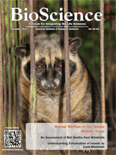
BIOSCIENCE
metrics 2024
Fostering excellence in biological research and education.
Introduction
BIOSCIENCE, published by Oxford University Press, is a leading journal in the field of Agricultural and Biological Sciences, recognized for its rigorous peer-reviewed articles and innovative research contributions. With an impressive impact factor that places it in the Q1 quartile of its category, BIOSCIENCE ranks #7 out of 221 journals in its field, representing the top 3% of publications based on Scopus data. Since its inception in 1972, it has provided a platform for the dissemination of knowledge and advancement in various biological domains, making it an essential resource for researchers, professionals, and students dedicated to the life sciences. The journal does not currently offer open access options, yet its comprehensive coverage—from cellular biology to ecosystem dynamics—ensures it remains a pivotal reference for ongoing biological studies and developments. Readers can find its latest issues through the ISSN 0006-3568 or E-ISSN 1525-3244, ensuring broad accessibility to its impactful content.
Metrics 2024
 2.37
2.37 7.60
7.60 9.40
9.40 242
242Metrics History
Rank 2024
Scopus
IF (Web Of Science)
JCI (Web Of Science)
Quartile History
Similar Journals

Tropical Life Sciences Research
Advancing the Science of Tropical Biodiversity and HealthTropical Life Sciences Research, published by PENERBIT UNIVERSITI SAINS MALAYSIA, is an esteemed open-access journal dedicated to the realms of Agricultural and Biological Sciences, Biochemistry, Genetics, and Molecular Biology, and Medicine. Since its inception in 2006, this journal has established itself as a significant platform for disseminating high-quality research findings that contribute to the understanding of tropical biodiversity and health-related issues. With its innovative approach, Tropical Life Sciences Research has garnered an impressive impact factor, reflecting its influence in the academic community; it is ranked Q2 in Agricultural and Biological Sciences and Q3 in both Biochemistry and Medicine categories as of 2023. Researchers and professionals can access a wealth of knowledge through this journal, whose content spans from 2009 to 2024, making it a vital resource for students and experts alike interested in advancing the science of tropical ecosystems and health. The journal also stands out for its comprehensive Scopus rankings, indicating its relevance and quality in the competitive academic landscape.

PACIFIC CONSERVATION BIOLOGY
Elevating conservation discourse with impactful findings.PACIFIC CONSERVATION BIOLOGY is an esteemed academic journal published by CSIRO PUBLISHING, dedicated to advancing research in the fields of ecology and nature conservation. With a strong focus on the unique challenges and biodiversity of the Pacific region, this journal serves as a crucial platform for researchers, conservationists, and students alike to disseminate high-quality, impactful findings. Operating from Australia, it has become a significant resource since its inception in 1993, navigating through nearly three decades of vital scholarly communication. Ranked in the Q2 category for both Ecology and Nature and Landscape Conservation as of 2023, PACIFIC CONSERVATION BIOLOGY maintains rigorous standards, as reflected in its successful Scopus rankings. The journal plays a pivotal role in addressing pressing ecological issues and fostering innovative conservation strategies, making it an essential reference for anyone involved in environmental science. Access options for the journal facilitate widespread distribution of knowledge, supporting the mission to promote informed decision-making in conservation practices.
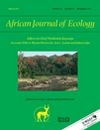
AFRICAN JOURNAL OF ECOLOGY
Advancing Knowledge in Ecology and ConservationThe African Journal of Ecology, published by Wiley, is a leading academic journal in the field of Ecology, Evolution, Behavior, and Systematics. Established in 1963 and continuing its vital contributions to the field until 2024, this journal serves as a premier platform for researchers and scholars to share groundbreaking studies that explore the intricate relationships within ecosystems, particularly in the African context. With an impressive Scopus Rank of #423 out of 721 and a Q3 Quartile ranking, it stands as a credible source of scholarly information, gaining recognition among peers for its rigorous peer-review process and impactful publications. While the journal is not open access, it remains influential in driving advancements in ecological research and providing insights vital for conservation efforts and biodiversity studies. Authors and readers alike will find that the African Journal of Ecology not only promotes scientific inquiry but also fosters a deeper understanding of ecological dynamics that affect our world.
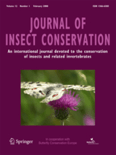
JOURNAL OF INSECT CONSERVATION
Empowering Scholars to Protect Our Insect HeritageJOURNAL OF INSECT CONSERVATION, published by SPRINGER in Switzerland, is a leading peer-reviewed journal that focuses on the preservation and study of insect biodiversity and ecology. With an ISSN of 1366-638X and E-ISSN 1572-9753, this journal represents a vital resource for researchers and practitioners in the fields of Animal Science, Ecology, and Insect Science. The journal consistently ranks among the top quartiles, achieving Q1 status in Animal Science and Zoology and Q2 in other pertinent categories in 2023, according to Scopus rankings. This reflects its significant influence in the academic community, with a solid impact factor that highlights its importance in advancing the discourse on insect conservation. Though not an open access journal, it provides critical insights and innovative research findings from 1997 to 2024, making it an essential platform for those involved in the conservation of insect species and their habitats. As a scholarly resource, the JOURNAL OF INSECT CONSERVATION is dedicated to fostering knowledge dissemination and inspiring future research in pressing environmental issues.
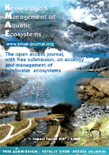
Knowledge and Management of Aquatic Ecosystems
Exploring the Depths of Aquatic KnowledgeKnowledge and Management of Aquatic Ecosystems, published by EDP SCIENCES S A, is a premier open-access journal dedicated to the interdisciplinary study of aquatic ecosystems. With an ISSN of 1961-9502 and an impressive history since 1928, this journal serves as a vital resource for researchers and professionals in the fields of Ecology, Aquatic Science, Water Science and Technology, and Nature Conservation. The journal has consistently achieved high rankings, including a Q2 classification in multiple categories, which underscores its significant contribution to the evolving landscape of aquatic research. With access options that promote widespread dissemination of knowledge, Knowledge and Management of Aquatic Ecosystems aims to bridge gaps in research, policy, and practical applications, making it an invaluable asset for students, researchers, and policymakers aiming for impactful solutions in aquatic management and conservation.

BIODIVERSITY AND CONSERVATION
Fostering dialogue on biodiversity preservation.Biodiversity and Conservation is a leading peer-reviewed journal published by Springer, dedicated to advancing the understanding of biodiversity and the critical aspects of conservation biology. With an impact factor that consistently places it in the Q1 category across multiple fields including Ecology, Evolution, and Nature and Landscape Conservation, this journal serves as a vital resource for researchers, professionals, and students who aim to address the pressing challenges of biodiversity loss and ecosystem management. Established in 1992, the journal has successfully created a platform for high-quality research and innovative approaches, facilitating the dissemination of knowledge that informs conservation practices globally. With a strong ranking in Scopus, it highlights the importance of rigorous scientific inquiry in the preservation of our natural world. Subscribers can access a wealth of articles that encompass a broad range of topics pertinent to both theoretical and practical aspects of biodiversity, encouraging an interdisciplinary dialogue among the diverse fields of environmental science and conservation.
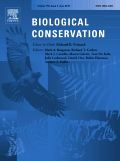
BIOLOGICAL CONSERVATION
Championing Research that Safeguards Nature's Richness.BIOLOGICAL CONSERVATION, published by Elsevier Science Ltd, is a leading international journal dedicated to advancing the science and practice of biological conservation. Since its inception in 1968, the journal has provided a critical platform for researchers, professionals, and students in the fields of Ecology, Evolution, Behavior, and Systematics as well as Nature and Landscape Conservation. With an impressive impact factor, and ranked in the Q1 category within both ecological and conservation domains in 2023, it emphasizes high-quality empirical and theoretical research essential for understanding and addressing pressing environmental challenges. Although it follows a subscription model, the journal is known for its rigorous peer-reviewed articles that contribute significantly to the field, ensuring that the latest findings and methodologies are readily accessible to practitioners. As a vital resource for those engaged in conservation efforts globally, BIOLOGICAL CONSERVATION stands out for its commitment to enhancing knowledge and informing strategies that safeguard biodiversity across ecosystems.

NEW ZEALAND JOURNAL OF ECOLOGY
Bridging Theory and Practice in Ecological ResearchNEW ZEALAND JOURNAL OF ECOLOGY, published by the New Zealand Ecological Society, stands as a premier platform for disseminating research in the field of ecology, with a notable impact factor reflected in its Q2 ranking in multiple ecology categories for 2023. Established in 1980 and actively publishing since 1982, this journal provides a vital resource for ecologists and environmental scientists, fostering the exchange of innovative ideas and methodologies. The journal covers a wide range of ecological topics, ensuring a comprehensive overview of the current trends and research developments in both ecological theory and practical applications specific to New Zealand and beyond. Researchers, professionals, and students will find in this journal an authoritative source to advance their understanding of ecological dynamics and contribute to the growing field of ecological science. The journal is accessible to the community without open access, providing critical insights that underpin the ecological landscape of New Zealand and inform sustainable practices worldwide.
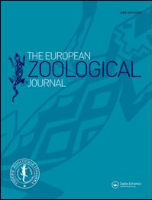
European Zoological Journal
Connecting Research and Conservation for a Sustainable FutureEuropean Zoological Journal, published by Taylor & Francis Ltd, is an esteemed open-access publication dedicated to advancing the exciting field of zoology. Since its inception in 2017, this journal has progressively established itself as a vital resource for researchers, professionals, and students alike. With its Q2 ranking in Animal Science and Zoology as of 2023, the journal ranks in the 69th percentile among its peers, showcasing its influence and contribution to the discipline. The journal’s broad scope covers a wide range of topics within zoology, aiming to foster an understanding of animal biology and conservation efforts. As an open-access journal, it not only enhances the dissemination of knowledge but also encourages collaborative research across global communities. Situated in the United Kingdom, the European Zoological Journal invites submissions that contribute to the evolving discourse in animal sciences, and endeavors to support the scientific community in addressing pressing ecological challenges.

BIOLOGY BULLETIN
Exploring the Frontiers of Agricultural and Biological Sciences.BIOLOGY BULLETIN is a prominent academic journal published by PLEIADES PUBLISHING INC, dedicated to advancing the fields of Agricultural and Biological Sciences as well as Biochemistry, Genetics, and Molecular Biology. With an ISSN of 1062-3590 and E-ISSN of 1608-3059, the journal has been a vital resource for researchers and professionals since its commencement in 1996. Located in the United States, BIOLOGY BULLETIN operates within a highly competitive academic landscape, achieving a 2023 ranking in the Q3 quartile for Agricultural and Biological Sciences and Q4 for Biochemistry, Genetics, and Molecular Biology, highlighting its commitment to delivering impactful research despite its challenges. Researchers seeking to publish their findings will find a platform for significant insights, as reflected in its Scopus rankings, where it stands at #183 and #199 out of 221 in its respective categories, showcasing opportunities for growth and visibility. While currently not an open-access publication, BIOLOGY BULLETIN plays a crucial role in facilitating scholarly communication and fostering an understanding of biological sciences, making it an essential read for academics, professionals, and students alike.